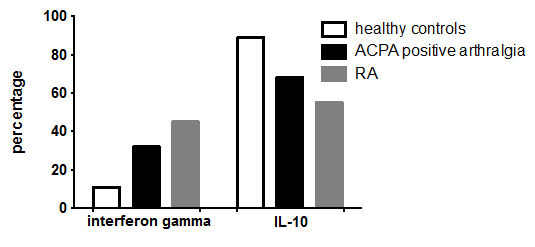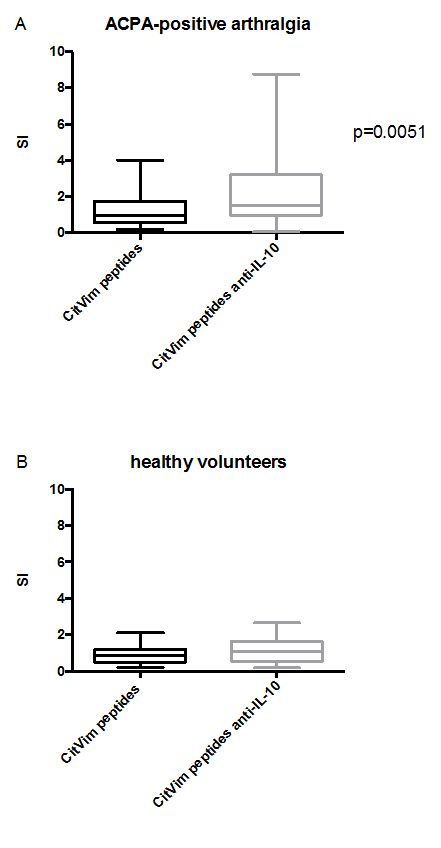Session Information
Session Type: Abstract Submissions (ACR)
Background/Purpose: The pathogenesis of RA can be conceptualised by sequential phases that precede the development of synovitis. Autoimmune antibody responses, including ACPA, can precede clinical synovitis. Our demonstrating a role for T-regs in ACPA-positive individuals without synovitis, may focus the development of treatments that can strengthen T-reg function.
Methods: 21 ACPA+ individuals with arthralgia but without clinically detectable inflammatory arthritis, 20 individuals with ACPA+ early RA (<12months after starting DMARD) and 20 healthy volunteers were recruited from clinical studies. Peripheral blood mononuclear cells were incubated with peptide pools covering the entire sequence of citrullinated vimentin (CitVim); in some incubations, anti-IL-10 neutralising antibody was added. After 72 hours, IL-10 and IFN-g T-cell responses were enumerated by ELISpot. A positive response was defined by a stimulation index (ratio of spots with peptide to spots with negative control)>3.
Results: CitVim-reactive T-cells were readily detected in healthy volunteers, ACPA+ arthralgia and RA and there was a significant difference in the quality of this response between these groups: there was a sequential reduction in the percentage of individuals who had IL-10 CitVim-specific T-cell responses and an increase in IFN-g responses as we move from health to ACPA+ arthralgia to RA (Fig. 1). In order to determine whether IL-10 from CitVim specific T-cells had a regulatory role, we blocked IL-10 function with a neutralising antibody and found an increase in the magnitude of the IFN-g CitVim responses in the ACPA+ arthralgia, whereas in health there were no IFN-g responses (Fig. 2).
Conclusion: We demonstrate a sequential change from a regulatory (IL-10-predominant) to an inflammatory (IFN-g) CitVim-specific T-cell response as we move from health to ACPA+ arthralgia to RA. We have also shown that autoreactive IL-10 T-reg responses are actively inhibiting IFN-g responses in ACPA+ arthralgia individuals. It is plausible that such regulatory T-cell responses prevent progression to disease in health and in pre-clinical RA.
Fig. 1. IL-10 and IFN-g responses to CitVim peptide pools can be detected by ELISpot. The percentage of individual with IL-10 and IFN-gamma cit-vim specific T-cell responses differed between RA, ACPA+ arthralgia and healthy volunteers (c2=28.4, p<0.0001).
Fig. 2. IL-10 mediated suppression of CitVim IFN-g T-cell responses. A. There was an increase in CitVim IFN-g T-cell responses after IL-10 blockade in ACPA+ arthralgia (N=5, p=0.0051). B. In healthy volunteers there was no increase (N=5).
Disclosure:
A. Aslam,
None;
J. L. Nam,
None;
L. Hunt,
None;
C. Rakieh,
None;
A. W. Morgan,
None;
P. Emery,
None.
« Back to 2014 ACR/ARHP Annual Meeting
ACR Meeting Abstracts - https://acrabstracts.org/abstract/citrullinated-vimentin-specific-regulatory-t-cell-responses-associate-with-acpa-positive-individuals-with-non-specific-musculoskeletal-symptoms/


